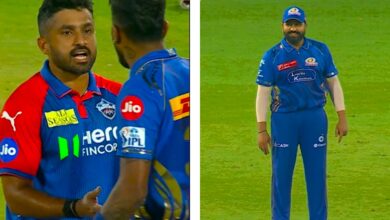How Jannik Sinner defended his Australian Open crown and showed he is the best player in the world | Tennis News

When Jannik Sinner had won his career’s first Major at last year’s Australian Open, his unassuming tone and broken English combined to deliver the most un-ironically pithy quote from one of tennis’s most understated champions. “I like to dance in the pressure storm,” he had said.As the 23-year-old World No. 1 from Italy was midway through defending his Australian Open title against Alexander Zverev in Sunday’s final, serving at 5-6 30-30, the very best tennis came out of him under pressure. Sinner’s second serve was returned with gusto, his overhit drop shot came back, and his opponent stood at the net to finish off the point. Instead, two phenomenal on the run sliding forehands followed a pick up backhand down the line to steal the point. The crowd erupted; Sinner may not have even betrayed a smile, but he was dancing alright.
As far as pressure moments go, that was among the very few to occur in front of an expectant Rod Laver Arena crowd that may have wished to watch a titanic contest between the world’s two highest-ranked players, but instead witnessed a one-sided procession. Sinner bludgeoned Zverev 6-3, 7-6 (4), 6-3 to win his third Grand Slam title, after also winning last year’s US Open. The dominant performance further underlined his status as the best player in the men’s game. He became the first Italian to win three singles Majors.
“It was an amazing performance from my side.” Sinner said, trophy aloft, after sealing the victory. “I want to enjoy this one. This one has a different feeling (and) means so much to me.”
With the uncertainty of what is to come this year, for Sinner, the routine triumph would be sweet. After evading a ban following two failed dope tests – successfully appealing his case of accidental contamination – the World Anti-Doping Agency (WADA) has appealed to the Court of Arbitration for Sport (CAS) to intervene. CAS has scheduled the hearing for April 16-17, mere months before the French Open and Wimbledon, which would mean that if he is served a suspension, even a short one, he is still unaware which Major he will play next.
For now, he is allowing himself to enjoy this victory. “Many, many things happen off the court, what you maybe don’t know. When I go on the court, even if sometimes it’s very difficult to block these kind of things, I have the team and people who are close to me who trust me,” the Italian added.
Dull deception
The young Italian’s mild manners can feel so dispassionate that it verges on being dull, in stark contrast to the charisma of men’s tennis’s other protagons – the sparky Carlos Alcaraz and the defiant Novak Djokovic. Yet, the ferocity with which he strikes the ball and the fluency with which he glides across the court make for a devastating combination, and Zverev was very much on the receiving end of it on Sunday.
Both players entered this match in their third Major final but the scoreline perfectly essays the massive gulf in class: Sinner became only the eighth man in hory to win each of his first three, Zverev became the sixth to lose each of his first three.
Zverev’s effective but limited game plan was executed as well as it could have been. He served remarkably well and hit a mean backhand on the rise. But it is not just the might of Sinner’s groundstrokes, it is the metronomic consency with which he keeps putting the ball back into play with the same level of power: no balls are left neutral and no neutral balls are left unpunished. The former junior skier’s movement and flexibility are top-tier and his ability to hit shots, particularly his backhand, in an open stance on the run means power can be unleashed on virtually all the balls. It was that quality that pummeled Zverev into submission.
The match began as the duo felt each other out and played long, passive rallies. Eventually, down 3-4, the German’s serve cracked enough for Sinner to find a breakthrough and after a 10-minute period in which Sinner showed his superior quality from the baseline and the net, he was up a set.
As Zverev went into lockdown mode on serve, he put together the only period of the match where the result looked slightly uncertain. But an unlucky net cord – at 4-4 in the second-set tiebreaker – would be his undoing. After a couple of big forehands, Sinner had an unassailable-looking lead. Zverev was down for much of the third set and Sinner made his only break point count before rolling to the easy victory.
The German was so well beaten this time that he may be able to evade some of the criticism that followed his previous two defeats on this stage, in which he slumped despite being in a favourable position to win. On a day when he was so convincingly dispatched, to highlight Zverev’s inability to improve technically and tactically to produce the goods at best-of-five level after showing nearly a decade of ‘promise’ may come across as punching down – perhaps a poor choice of words to describe the man in question.
For Sinner, the eye is on what is next. After his third successive hard court major, he wants to replicate the success on other surfaces. “You have to be a complete player, not only on one surface but also on the other two,” he said in a post-match press conference, per Reuters. “I like the difficulties (of) trying to understand where I can improve. Hopefully I can show that when the season arrives.”
Nobody knows whether he will be allowed to do so, but the best, most dominant player has certainly shown he is capable.




